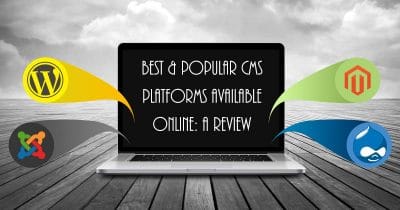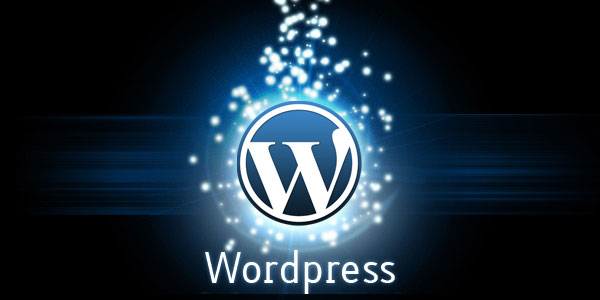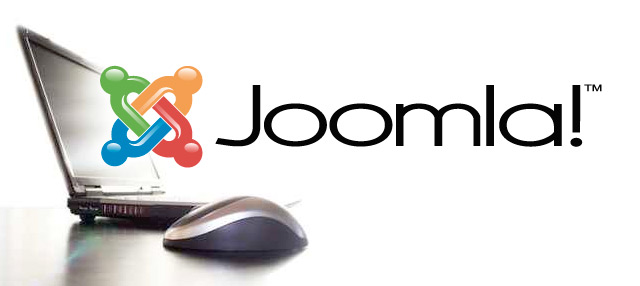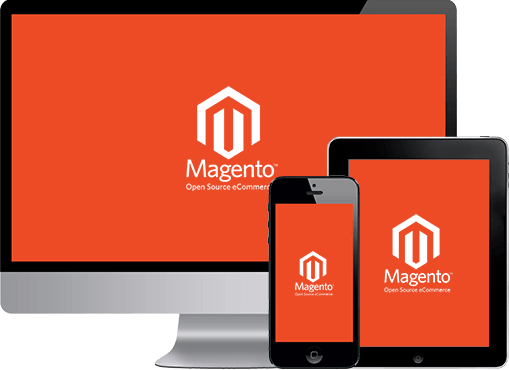You probably are working on the criteria for starting up a blog. You might have been asked to launch your own employer’s corporate website.
In any case, the main aim is to keep the website up and running both at the same time. All this can be made easily possible only with the use of the right Content Management System (CMS) Platform!
A businessman knows what is best suited for their business. Going further with this thought, it is expected from a businessman to have knowledge about making his business run in a fast and extraordinary manner.
Using a good CMS can let one do so with ease. The knowledge about how to apply the best use of CMS for your business and how to fetch the best out of the platform can make your business graphs go in an upward direction most of the time.
Before proceeding further, let’s take a dive into the world of CMS…
Jump to Section
What Is a CMS?
A Content Management System, or CMS, is a platform designed for the management of data uploading, editing, and downloading a website online.
It helps in updating the data in the system on a regular routine by the administration.
CMS platforms can vary widely and tend to provide a bunch of benefits in comparison to other methods for creating a website.
These platform allows websites to feature dynamic content without fussing about updating the content on a regular basis, looking on to the customized options for content designing and scorching for a wide range of features including customer account areas or e-commerce.
The CMS Process
The whole process of CMS includes having an Admin Panel of your own. Through this panel, there is an interface of creating and updating posts, pages, and any other type of content and arranging it your way.
One will also be allowed to modify the design of the website through the Admin Panel of this platform through the installation of various premade themes.
The best part of using CMS platforms is that one does not have to write and remember difficult code for completing any action. All actions can be completed with the touch of a single click.
Nature of CMS
Content Management System (CMS) is an open-source software by nature!
All of the sources mentioned under the list of CMS are free to download and use. The benefit of this open-source engine is that its source code is open for public use, which further provides a sense of authority.
Due to their basic open-source nature, CMS platforms are used by a large community, thus paving the way to time-to-time change for its improvement in the form of new plugins, add-ons, and extensions.
CMS Means Freedom
One is given the freedom to use, edit, or customize the core files of the platform. In case you discover a unique way for the improvisation of this platform, then you can definitely get a developer who can provide a helping hand in making this platform with a better and improved version.
Which CMS Is the Best for You?
After having a brief discussion about CMS, one can actually make out that a certain CMS platform is required for designing and creating a website suiting your needs and requirements. So, let’s proceed further.
List of Best CMS Tools
It is important to keep in mind that the decision of choosing a good or bad CMS can help in making or breaking your potential sites. Hence, it is important to have a thorough knowledge about which CMS platform is suitable for your work requirements.
Below is a detailed guide about Top 6 CMS Platforms which can save you from falling into the trap of choosing the wrong CMS. These solutions have their own strengths and benefits which can be molded and applied as per your necessity.
WordPress
WordPress is one of the most widely used and highly popular CMS Platforms ever. It is estimated that almost 60% of the CMS users choose WordPress as their preferred platform.
It is an open-source platform that does not require any kind of purchase as it is free to operate. It tends to offer a simple and quick installation when done manually.
In addition, this range of CMS is constantly fed and enhanced by a community of contributors, thus paving the way to the creation of new themes and plugins. The flexibility of tools along with the benefit of an easy to use interface make this platform stand out among the rest.
WordPress – Features
WordPress is loaded with SSL Compatibility, Granular Privileges, and Content Approval Tools that tend to make your content sound secure by limiting access as per your set administrative levels. WordPress can also rely on the Automatic Problem Notification feature, Email Verification, and Captcha Tools as additional security layers.
Its clearly labeled dashboard lets you customize your content with the use of graphs, chart generators, and native. It can further be customized with third-party plugins including inventory management, point of sale systems, shopping carts, and affiliate tracking.
WordPress serves as an ideal solution for new bloggers and website builders. One does not require a single penny investment to start with WordPress. The best part is you can launch your website run right away.
So, before you actually jump onto the decision of choosing WordPress as your preferred choice, look at its Pros and Cons to take a wise step.
Pros of Using WordPress
- It is designed for the mass market, hence it is easy and simple to use.
- It offers a wide range of widgets and plugins, as well as free and premium templates, which makes it flexible as per your needs.
- This platform is integrated with several plugins that make your website be on top searches without putting extra efforts.
Cons of Using WordPress
- Since it is open-source, there are high chances of hackers attacking your site. You need to take additional measures to prevent this.
- More volume of content uploaded creates an issue sometimes so one may need to consider something more suitable regarding the volume matter.
Drupal
Drupal is regarded as one of the most technical CMS in the industry. It serves as the best choice for your business if you could manage it well.
It is an open-source CMS application that holds the capability of handling thousands of web pages with ease. It is often termed as the most flexible option. However, in real terms, it requires a high level of programming knowledge to take proper advantage of its flexibility factor.
Drupal – Features
Drupal is an SEO (Search Engine Optimization) friendly CMS. It is further loaded with modules and tools that help in creating content relevant to your target audience.
It is loaded with Email forums, Site Maps, Blog Tools, and Search Engine Optimization tools that work towards enhancing the quality of your content.
The add-on feature coating for business and e-commerce websites makes it labeled as unique from others. Features including point-of-sale systems, live chats, help desks, inventory management, and shopping carts lend a strong hand to its community support system. Also, performing vital functions like managing documents, tracking projects, and creating database reports helps in serving the needs of a mid-sized business assigned with the responsibility of managing a lot of content.
The Drupal Plugins
Drupal has some of the best plugins and add-ons available, including a decent theme selection and site wizard for listing your business online as soon as possible. Its highly active community buzzes with a lot of user support queries being fed with a lot of coding making them really powerful.
Though it falls under the reach of an open-source platform, Drupal is actually more complex than others. Hiring a Web Developer or a Team of Development Staff and Designers may be required to build a really good and user-friendly website.
Let us analyze the concept of Drupal more profoundly to gain its better knowledge.
Pros of Using Drupal
- It comes with an array of user-friendly features to facilitate the high-end development of basic blogs, websites, and forums.
- Its Admin panel comes with advanced functionalities and features.
- Its pre-built templates and themes offer great design and customization for website development.
- It includes an easy process while collaborating with the users.
Cons of Using Drupal
- It has a difficult learning curve and requires great technical expertise.
- It does not hold an impressive backward compatibility.
Joomla
If you are looking for an easy, powerful, and manageable CMS platform, then Joomla is definitely the one for you! It is a platform that is easy to build, manage, and edit.
Joomla is an open-source CMS application that serves as the best choice for small businesses. It is regarded best for social networking and e-commerce websites. To use it, you need to use only basic technical coding skills.
This system is appropriate for the use of developers having coding experience. Being a free of charge platform that is quite active, it offers the availability of helping you out with your needs and requirements as per your business demands.
Joomla – Features
Joomla is loaded with Email Forums, Blogs, Photo Galleries, and Discussion Forums as its standard add-ons for website development. The addition of user-contribution pages and the allowance of visitor’s add-up content is one of its best features.
The security measures associated with Joomla guards your important content during any kind of interaction with the site visitors. The integration of Captcha ensures the human presence of the sender and the SSL Compatibility enables you to protect sensitive pages and content with secure passwords.
Its dashboard allows easy navigation during the creation and uploading of content. The management of allowed documents, projects, and file distribution is performed well with its additional add-ons.
Certain pros and cons are attached to this format for its better understanding. Let’s have a look at it:
Pros of Using Joomla
- It has a handful of available extensions for an e-commerce platform, thus allowing you to manage your content as well as products, all in one place.
- The editing and structuring involved in this platform are quite intuitive and smooth.
- It does not require the involvement of a developer for decoding its usage as it is easy to understand and adapt.
Cons of Using Joomla
- It is a slightly complex platform in comparison to WordPress.
- It contains a limited marketplace for additional add-ons and modules.
Magento
Magento is yet another open-source CMS platform suited best for developing e-commerce websites. It is one of the fast-emerging e-commerce CMS platforms with new features and desired functionality.
Magento – Features
It is integrated with the use of MySQL and Zend PHP databases. It serves as a reliable platform for managing various web pages and daily updates added by an administrator. Loaded with a single backend CMS, Magento helps you with the creation of multiple online stores. It has a ready-to-go sample store that can get you with website development in no-time.
Though it does not require vast information as to its introduction; the featuring of some advantages and disadvantages can certainly help with further guidance.
Pros of Using Magento
- It is a user-friendly platform with a user-friendly interface that is entirely spontaneous, well-organized, and highly manageable.
- It’s templating architecture allows website customization as per your needs and wants.
- Whether you are offering 10 or 10,000 products, Magento can handle it quite well.
Cons of Using Magento
- It is an extremely large system with over 20,000 files and 200 database tables, thus making it fall under the category of requiring a good developer with experienced skills.
- It usually requires more time to make the same customizations as in other solutions.
Choose the Right CMS and Get Started!
Finding reasons for choosing one over the other actually makes the process easier! There are various things that must be considered before arriving at your final verdict. The filter of your expectations, your aims, and the whole-sole purpose of your website must be applied before choosing the best one.
The above listed CMS Platforms are however the best and most-used among all and can be utilized for website building or content uploading.
- What Is Big Data Visualization? - January 22, 2021
- Five Benefits of Big Data Analytics for E-commerce - July 9, 2020
- Google Data Studio Vs. Tableau: Which One is More Suitable for Your Business? - June 25, 2020









